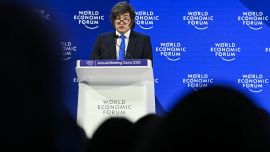No government would tell you they will devalue before devaluing. The reason is obvious: anticipating the move would trigger panic. But besides numbers, markets measure moods and tones. And the tone they got from President Javier Milei this week may not have been reassuring.
A debate is raging about the value of Argentina’s currency. Critics argue it is overvalued because Milei and his economic team are using the exchange rate as one of the anchors to control inflation (there are others, like utility rates, but to a lesser degree). The government replies that a strong peso is a sign of a strong economy, symbolised by the fact that the country has no fiscal deficit.
Brownie points to Milei and Economy Minister Luis Caputo: in 2024, Argentina had twin fiscal and trade surpluses for the first time in 14 years (since 2010, under Cristina Fernández de Kirchner). Brownie points to his critics: according to the Big Mac index published by The Economist, the peso was undervalued 33 percent versus the US dollar in January 2024; it is 20 percent overvalued now.
Both things are true, but fortunately for politics and life, the future does not result from following past trajectories. Argentines are giving Milei the benefit of the doubt, but if you look back, you see several similar situations in which a strong peso led to a major macroeconomic imbalance that ended in a violent crash.
That is why it is remarkable that, of all people, Milei could pick to fight this issue in public, he picked Domingo Cavallo — the minister who masterminded and implemented the ‘convertibility’ peg of the peso to the US dollar in the 1990s and then saw his economic Frankenstein collapse in his own arms a decade later, in late 2001.
Cavallo has been here before, and of all people, he knows well what led to the implosion of his model, which had a healthy run for about half a decade and started to accumulate trouble in the late 1990s, impacted by emerging market crises in Mexico, Russia and Brazil, and by its own budget balance and competitiveness inconsistencies.
But one Milei line to highlight from his attack on Cavallo – beyond calling him “a disgrace” – is the claim that when he was economy minister, the former official “would insult all those who claimed the peso was overvalued.” Although this is very much what Milei himself is doing now, his description is nonetheless fairly accurate.
In the mid-1990s, Cavallo was the country’s second-most powerful person, after then-president Carlos Menem. In 1996, he was fired over differences with Menem regarding the fine print of the convertibility programme. One sticking point was corruption — a trend in the Menem administration to benefit shady local business groups. Cavallo knew that to endure, convertibility needed a major inflow of foreign investment.
The most brutal version of Cavallo made a comeback to the Economy Ministry in March 2001, under the politically frail government of Fernando De la Rúa. He returned as the only person who could save convertibility, which De la Rúa wanted to keep at all costs. After a couple of months of euphoria – which included ordering a “zero deficit” programme – the markets gave Cavallo a thumbs down. The minister went mad about it: “Who are the markets? They are a bunch of kids who don’t understand a thing,” he shouted one day. He was ejected that December, the day before De la Rúa — technically without having devalued the peso, but with 38 people dead in violent clashes across the nation.
Milei has decided to take the Cavallo approach and attack those who criticise his programme. Like Cavallo then, on this point, he stands increasingly alone now. Milei has made a political point of swimming against the tide, but it is difficult to gauge when the forces against you are simply too strong to resist anymore.
Given the more populist leaning the country took after Cavallo’s fatal failure to make convertibility stick, over the years his voice has regained credibility, especially among foreign observers. Just like his furious attack on the markets in 2001, Milei’s wrath against Cavallo is, at the very least, an unforced error — one that adds to the most important question that both Argentines who live here and foreigners who invest here are increasingly asking: how will the President and his team react when push comes to shove?
Argentina is a country where leaders face hardships more often than they enjoy success. The elephant in the room will just not go away by force of shouting.



















Comments